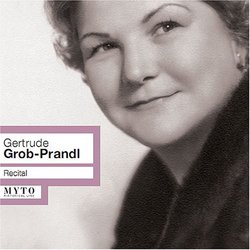| All Artists: Carl Maria von Weber, Giacomo Meyerbeer, Franz [Vienna] Schubert, Fromental Halevy, Richard [Classical] Wagner, Richard [1] Strauss, Gertrud Grob-Prandl, Hubert Hofmann, Rolf Polke Title: Gertrude Grob Prandl Members Wishing: 1 Total Copies: 0 Label: Myto Records Italy Original Release Date: 1/1/2008 Re-Release Date: 3/25/2003 Album Type: Import Genres: Pop, Classical Styles: Vocal Pop, Opera & Classical Vocal Number of Discs: 1 SwapaCD Credits: 1 UPCs: 675754598525, 8014399500715 |
Search - Carl Maria von Weber, Giacomo Meyerbeer, Franz [Vienna] Schubert :: Gertrude Grob Prandl
 | Carl Maria von Weber, Giacomo Meyerbeer, Franz [Vienna] Schubert Gertrude Grob Prandl Genres: Pop, Classical
|
Larger Image |
CD DetailsSimilar CDs
|
CD ReviewsAmazing voice, substandard recording KDS | 04/08/2007 (4 out of 5 stars) "It is enigmatic as to why Gertrud Grob-Prandl was not widely recorded. She had, upon much listening, the most powerful, secure, indeed almost surreal heroic soprano I have ever heard. Birgit Nilsson fans are justified in their praise, but it is irrefutable upon hearing Grob-Prandl that she equaled or excelled Nilsson in every parameter. What is immediately evident in these live recordings is how much larger her voice is when compared to her counterparts. Keep in mind they are all miked equally. There are times in ensemble that you simply cannot hear the other singers, or during a duet, her partner sounds as if he/she is backstage! She certainly is capable of scaling the tremendous voice down, as evident in her recording of Mozart-not part of this recording, but there is no denying it was best at full throttle. She has no fear whatsoever in any repetoire. Her "HoJoToHo" segment is the finest Valkyrie cry I have ever heard-unbelievably secure and powerful. It is the Elektra segments however I find most interesting however. I have listened to many Elektras, including Nilsson's with Solti, and I have never heard such abandon in the role. Her "Was Bluten Muss" ends with a high C to end all high c's. Elektra is enraged by her mother in this scene, and you hear every bit of it in Grob-Prandl's voice. Grob-Prandl was a huge star in Italy, no doubt due to her Turandot. Keep in mind she was a contemporary of Nilsson. It is interesting to note Nilsson did not care for Italian audiences, and I believe it may be due to the fact that she had real competition in Italy in her repertoire. If you get a chance to hear Grob-Prandl in the role of Turandot, it will once and for all end the battle of dramatic sopranos. I have her Vienna performance of 1956, and while in german, her's are quite simply the most astounding vocalisms I have ever heard in this role. Her high c's at the climax of the opera are the most powerful, unrelenting notes you will ever hear. Indeed, upon lengthly listening, her voice begins to sound almost like a machine-artificially generated. Discover this voice. Gertrud Grob-Prandl deserves the crown of greatest heroic soprano ever, period. " The Most Thrilling Voice Possible! Impostazione | New York City Area | 08/25/2005 (5 out of 5 stars) "The truth is that Gertrude Grob-Prandl sings at about 45-65% of her full volume. As I listened, I was amazed at the beauty of the tone, the vulnerability in the gigantic voice, and lastly the awe-inspiring amplitude of her voice. The voice is very far forward at all times, rather warm, and supported on a column of steady air which seems to come from all over her body. Indeed, it is difficult to find from where her chief resonance emanates for though it is supremely in the mask, the tone is very open. But the tone has no audible bottom, not a ringing chest but an empty steel can indeed making a very loud sound. I can only assume that her technique was a miracle, because there is no audible difference in her tone over 20 years. The voice in 1972 is exactly the same as it was in 1949, perhaps a hair larger though. There is absolutely no unsteadiness. She is compared to Nilsson often, and upon hearing her, one found that she lacked Nilsson's authority and perhaps Nilsson's white cream timbre. In spite of this, I think Grob-Prandl's voice is more beautiful, freer, and certainly more agile. The big question may be, who had the bigger voice. The scale tips to Grob-Prandl, but as I listened, I always said that's enormous but Nilsson can do that too. But then, as the CD came to an end, the Elektra arias and scenes began and Grob-Prandl sang some high notes with a frequency that I had never heard...EVER. One high note in particular was like hearing and seeing thunder and lightening at the time. It was one of the most frightening experiences of my life, and I could not believe what I had just heard. It was not entirely pleasant though almost like a 777 scrubbing the runway without landing gear. My conclusion is that Gertrude Grob-Prandl was unique and not even Nilsson, Mancini, Crespin, Dimitrova or Turner could match the sheer volume of that blazing voice." A most incredible voice... B. Cathey | Wendell, NC United States | 09/01/2006 (5 out of 5 stars) "In the past 10 years several recordings of works featuring the hochdramatische sopran Gertrude Grob-Prandl have--at last--surfaced on CD. Thanks to Walhall Records we now have TWO TURANDOTS (the one from 1956 from Vienna is absolutely unbelievable and essential!), a TRISTAN (Archipel), her WALKURE Brunnhilde from Geneva (Gebhardt), her SIEGFRIED and GOTTERDAMMERUNG Brunnhilde in the Rudolf Moralt RING cycle (Myto), her in IDOMENEO and DON GIOVANNI. This present disc provides the listener with a sampling of just how unbelievably magnificent her voice could be, and what range she had. She rivals Nilsson in the power and authority of her voice. She mounts the most difficult passages with ease and assurance--the voice is well-placed and all-encompassing, and always attractive and warm. This disc demonstrates that she was equally at home in Wagner, R. Strauss, Meyerbeer, Halevy, and lieder. I've played this disc for friends who had never heard of her previously; invariably their question is: "Why haven't I heard of her before!!?" And, "Why didn't the record companies record her??" All I do is point to what is available, and the hope that more will be released."
|

 Track Listings (15) - Disc #1
Track Listings (15) - Disc #1


